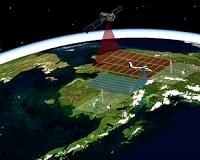 |
Washington DC (SPX) Jun 01, 2010 Late May 2010 brought peacock-hued swirls of blue and green to the North Atlantic. The iridescent waters formed a giant arc hundreds of kilometers across, extending from west of Ireland to the Bay of Biscay. The Moderate Resolution Imaging Spectroradiometer (MODIS) on NASA's Terra satellite captured this natural-color image on May 22, 2010. The vibrant colors are from tiny organisms, phytoplankton, that grow explosively in the North Atlantic-from Iceland to the shores of France-in the spring and summer. Phytoplankton require nutrients to reproduce, and phytoplankton blooms are often tied to events that bring nutrients to the ocean surface, such as dust plumes. Volcanic ash can also contribute nutrients for phytoplankton blooms. Researchers from the University of Hamburg's Institute of Geophysics found that a 2008 eruption of the Kasotochi Volcano in the Aleutian Islands generated a massive phytoplankton bloom in the Northeast Pacific Ocean. They concluded that iron-rich ash falling on waters that are otherwise poor in iron can create conditions in which phytoplankton thrive. MODIS acquired this image after weeks of eruptive activity at Iceland's Eyjafjallajokull Volcano. Considering that ash plumes from that volcano closed airspace over much of Europe, one might wonder whether ash provided fertilizer for this bloom. In this case, the answer is probably no. The North Atlantic Ocean already contains plenty of iron, and these waters experience massive phytoplankton blooms every spring and summer.
Share This Article With Planet Earth
Related Links MODIS Earth Observation News - Suppiliers, Technology and Application
 NASA Takes To Air With New 'Earth Venture' Research Projects
NASA Takes To Air With New 'Earth Venture' Research ProjectsPasadena CA (JPL) May 31, 2010 Hurricanes, air quality and Arctic ecosystems are among the research areas to be investigated during the next five years by new NASA airborne science missions announced. The five competitively-selected proposals, including one from NASA's Jet Propulsion Laboratory, Pasadena, Calif., are the first investigations in the new Venture-class series of low-to-moderate-cost projects established la ... read more |
|
| The content herein, unless otherwise known to be public domain, are Copyright 1995-2010 - SpaceDaily. AFP and UPI Wire Stories are copyright Agence France-Presse and United Press International. ESA Portal Reports are copyright European Space Agency. All NASA sourced material is public domain. Additional copyrights may apply in whole or part to other bona fide parties. Advertising does not imply endorsement,agreement or approval of any opinions, statements or information provided by SpaceDaily on any Web page published or hosted by SpaceDaily. Privacy Statement |